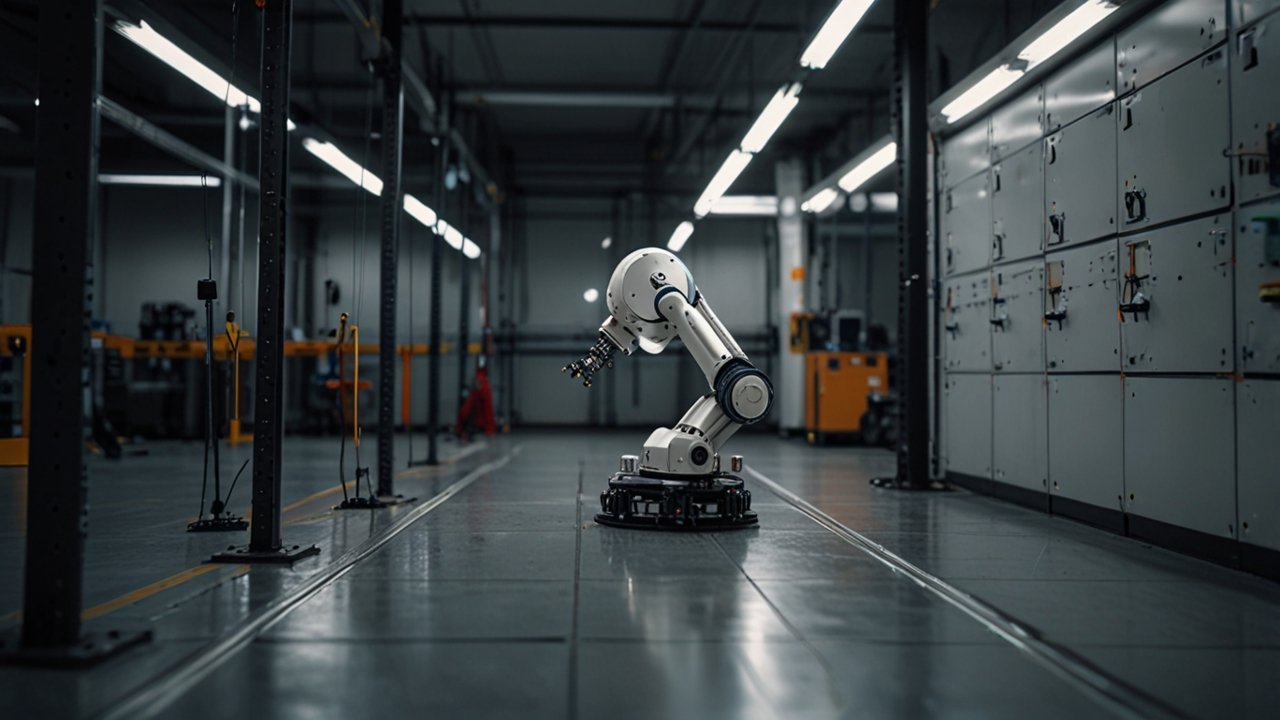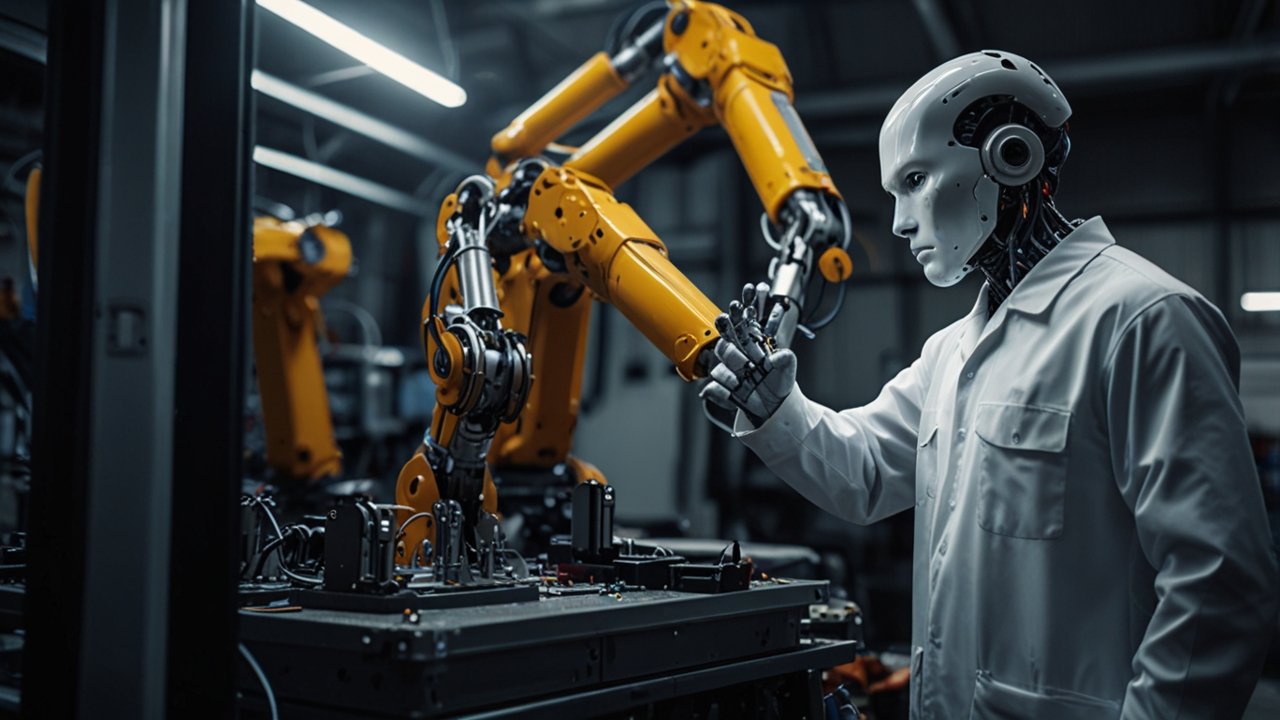Galaxy AI Coming: 6 Intelligence Features
Samsung’s latest innovation is sending ripples throughout the mobile technology landscape. Cutting‐edge developments are now converging on advanced features that enhance user experiences across every Galaxy device.
This article explores the timeline, features, and exciting future of this breakthrough. With a deep dive into historical evolution and real-world applications, you will understand how these intelligent capabilities came to fruition.
📑 Table of Contents
- Introduction to Galaxy AI coming
- Evolution and History of Galaxy AI coming
- How Samsung intelligence Enhances Galaxy AI coming
- Mobile AI Systems and Their Applications
- Real-World Case Studies of Galaxy AI coming
- Smart features in Modern Galaxy AI coming Solutions
- Future Trends: Android AI and Beyond
- A Glimpse into Galaxy AI coming Future Horizons
- FAQ
- Conclusion
By weaving together success stories, technical details, and industry trends, we invite you to join us on this exciting journey into tomorrow’s smart technology. Get ready to discover every exciting detail!
Introduction to Galaxy AI coming
Innovative Foundations and Vision
Samsung has laid a strong foundation by integrating artificial intelligence into its mobile devices. Early on, the company introduced a voice assistant known as Bixby in 2017. Despite its modest beginnings, this innovation set the stage for more advanced intelligent features. Today’s technology builds upon that initial effort, empowering users with unprecedented ease of access and enhanced functionality. The journey from simple command execution to complex data processing is impressive. You can learn more about the evolution of these smart devices from a detailed study on SamMobile.
The breakthrough culminated in a comprehensive intelligence layer in 2024 when Samsung unveiled a new system that uses both on-device and cloud computing. This improvement has significantly boosted privacy and productivity. Innovations such as contextual intelligence and natural language processing are key components. Samsung’s progress is not isolated; it aligns with global trends in mobile technology. Have you experienced similar technological leaps in your devices? Explore additional insights on Samsung UK.
In this section, you also notice the commitment to excellence as seen in partnerships with industry experts. The vision was not just to automate tasks but to create an integrated smart ecosystem that is both user-friendly and secure. Modern devices embody these features, allowing each user to enjoy a personalized experience like never before. What features do you value most in your smartphone? Also, check out our tag for Smartphones to learn more about device innovations.
Key Technological Drivers in the Early Phase
Early iterations of intelligent mobile systems were driven by the need for smarter user interactions. By harnessing the power of AI, Samsung began addressing everyday challenges such as battery life optimization and quick language translation. These initial innovations were crucial and set a clear trajectory for future developments. Observing these trends, the company gradually shifted toward a more secure and seamless intelligence processing approach. Reports from various sources suggest that improving privacy and on-device capabilities were deeply appreciated by users. Have you noticed a marked improvement in your device’s responsiveness?
The pioneering phase was characterized by a blend of hardware advancements and software enhancements. Samsung’s focus on efficient processing platforms enabled rapid evolution from early voice recognition to today’s multifaceted AI applications. The use of advanced processors like the Snapdragon 8 Gen 3 Mobile Platform played an important role. This not only improved AI responsiveness but also helped achieve remarkable battery optimization. You may refer to a detailed discussion on these processors on Samsung Newsroom Global.
Ultimately, the first wave of this technology introduced a new era of intelligent device interaction. Each breakthrough laid the groundwork for integration across multiple functionalities. As you reflect on this evolution, what early innovations do you think most influenced today’s smart capabilities?
Evolution and History of Galaxy AI coming
Global Milestones and Regional Developments
Samsung’s history with mobile intelligence stretches back over several years. Initially, the focus was on basic task automation through voice assistants. In 2017, Bixby was launched as an entry point into the world of AI-driven smart devices. This early phase helped familiarize users with voice command technology. Samsung’s dedication to user experience grew gradually. As a testament to its evolution, the company enhanced its offerings with a robust AI system in 2024. The transition incorporated both on-device processing and cloud computing, ensuring user privacy while delivering exceptional functionality.
Globally, industry giants like Apple and Google adopted similar strategies. However, Samsung’s approach emphasized hybrid computing to facilitate faster performance and improved user experience. In key regions such as Asia, notably South Korea and Japan, the adoption rate was phenomenal. These areas showcased immense enthusiasm for incorporating AI into everyday tasks. In the Americas and Europe, regulatory requirements drove innovation toward on-device processing to meet data privacy standards. Have you come across examples of such regional differences in the adoption of AI?
A closer look reveals that innovation was not isolated to one region alone. Even in Australia, enhanced smart features focused on productivity, lifestyle, and health. These varied regional innovations contributed to the overall global strategy. You can explore more contextual analysis on advancements by reading a feature on SamMobile. Additionally, check our tag for New Gadgets to stay updated on related news.
Technical Breakthroughs from Concept to Reality
The journey from conceptualization to market-ready innovation was marked by significant technical accomplishments. Early prototypes were refined using advanced hybrid processing systems. By integrating on-device and cloud-based capabilities, Samsung created a secure platform that addresses both performance and privacy. The introduction of contextual awareness enabled these devices to offer personalized briefings and smart suggestions. Innovations like generative AI transformed standard camera operations into dynamic creative tools. These breakthroughs allowed for generative photo editing and real-time scene optimization. Are you impressed by how these functions were woven together seamlessly?
Technical milestones include impressive innovations such as the integration of the Snapdragon 8 Gen 3 Mobile Platform. This chipset combined high-performance CPU, GPU, and Neural Processing Units (NPU). Such advancements ensured that processing loads were efficiently managed. Increased reliance on privacy controls allowed users to disable cloud-based features for sensitive tasks. This shift reflects growing consumer demands for data security and control. For further details, visit Samsung Malaysia.
As Samsung continued to refine its innovations, each milestone built upon the successes of the previous generations. These cumulative efforts have altogether paved the way for today’s highly advanced intelligent ecosystem. Reflecting on these technological breakthroughs, what do you think was the most significant change in the evolution of these mobile systems?
How Samsung intelligence Enhances Galaxy AI coming
Integrating Advanced Processing with Smart Efficiency
Samsung’s intelligence features have become deeply integrated into its flagship devices. The intelligence system goes beyond basic automation to deliver on-demand performance through a hybrid processing model. By combining on-device and cloud computing, it ensures privacy while handling heavy tasks. This system is engineered to learn user habits, achieving personalized battery optimization and predictive text capabilities. The technical innovation is visible in everyday scenarios, enabling faster image processing and more reliable translations. Do you appreciate the balance of speed and security in your mobile device?
Enhanced by a next-generation chipset, the system optimizes resource usage in real time. The Snapdragon 8 Gen 3 Mobile Platform, for instance, supports both demanding applications and routine tasks. This intelligent processing improves performance and increases energy efficiency. Such synergy between hardware and software makes the experience smoother and more enjoyable. Additionally, the new voice assistant capabilities now support natural conversation rather than simple command responses. If you are curious about detailed technical specifications, you may also refer to insights from Samsung Newsroom US.
Moreover, the system enhances privacy by allowing specific tasks to be processed solely on the device. This is particularly important for sensitive functions like photo editing and translation. The user now enjoys a fluid experience with secured personal data. Reflect on how such features can transform your day-to-day interactions with your mobile device.
Revolutionary User Interactions and Ecosystem Integration
The user interaction experience has been redefined by Samsung’s intelligence features. The new voice assistant goes beyond traditional command-response dynamics, offering a conversational interface that understands context. This natural language processing permits seamless interactions across various apps. Users benefit from predictive text that adapts to their style and patterns. The integration of on-device AI means that personal data remains secure without significant reliance on cloud storage. How do you think these advancements change the way you engage with your device?
Beyond individual device operation, Samsung is working toward a fully integrated ecosystem. This vision extends to wearables, tablets, and smart home devices, creating a unified digital environment. Data flows securely across multiple devices, ensuring continuity and a cohesive experience. Innovations in privacy controls further empower users to manage their data efficiently. For a broader view of creative integration and its effects, consider reading Samsung Newsroom Global.
By creating a consistent experience across devices and environments, Samsung intelligence transforms routine tasks into meaningful interactions. The dual benefit of secure processing and smooth multitasking makes the system truly revolutionary. In what ways could such inter-device connectivity benefit your daily activities?
Mobile AI Systems and Their Applications
Empowering Daily Activities Through Enhanced Processing
Mobile AI systems today are fast evolving to meet the diverse needs of users worldwide. The integration of artificial intelligence into mobile devices has transformed everyday activities such as photo editing, battery management, and real-time translation. The system is designed to help you perform tasks quickly, seamlessly, and securely. For example, enhanced camera intelligence automatically adjusts settings for optimal lighting and composition. Many users now enjoy generative photo editing that transforms ordinary pictures into memorable snapshots. How has advanced technology changed your approach to mobile photography?
In addition to camera improvements, features such as contextual predictive text and battery optimization are now prevalent. These applications ensure that the device adapts intelligently to usage patterns, prolonging battery life and boosting the overall user experience. The technology also supports health monitoring, offering insights on daily activity and stress levels. Such innovations are supported by advanced on-device processing power and intelligent analytics. For more detailed technical insights, please explore Samsung US Support.
This comprehensive approach to mobile AI brings together a range of functionalities. The improvements facilitate smoother multitasking and rapid data handling. The user benefits from a system that “learns” their habits and adjusts in real time, ensuring a secure yet flexible experience. Reflect on how these systems impact your daily mobile interactions and overall productivity.
Industry Applications and Real-World Integration
Businesses and everyday users alike are leveraging the power of mobile AI systems for increased efficiency. The technology is used in professional environments for note-taking and meeting summarization, simplifying communication and reducing manual workloads. This has been widely adopted in regions like Europe where privacy and productivity are top priorities. The possibilities extend to health monitoring systems that track physical activity and provide tailored recommendations. How might intelligent applications improve operational efficiency in your professional life?
Beyond business, these mobile systems support real-time applications such as live translation in meetings. For instance, users in Japan have experienced seamless language translation during cross-border communications, making meetings more efficient. Additionally, these capabilities have enhanced travel planning with features that automatically search for flight information and itinerary optimization. A detailed case study on travel enhancements is featured on SamMobile.
The fusion of hardware and software intelligence in mobile systems offers a glimpse into the future of everyday computing. This integration ensures that whether at work or play, the device is always ready to support its owner. What specific applications would you like to see more integrated into your mobile experience?
Real-World Case Studies of Galaxy AI coming
Success in Travel, Translation, and Productivity
Real-world examples highlight the transformational impact of intelligent mobile features. In the travel domain, one case study demonstrated how a user verbally requested, “Find direct flights to New York City and send them to Tony Kim.” In response, the system not only provided flight options but also compared deals and shared them seamlessly. This innovation saves time and reduces the complexity of travel planning. As reported by industry sources, these capabilities have quickly spread across multiple regions including the US and South Korea. Have you ever experienced such seamless travel assistance on your device?
Similarly, live translation has revolutionized international meetings, especially in Japan. The technology supports instant transcription and voice translation among Japanese, Korean, and English speakers. This has had a positive impact on global business communications, notably increasing meeting efficiency. In addition, productivity in European offices has been boosted by AI-powered summarization tools that reduce the burden of manual note-taking. For a broader perspective, refer to further details on Samsung Newsroom Global.
These examples illustrate how intelligent design is finding practical applications in everyday professional and personal tasks. The impact on time management and work efficiency has been significant, empowering users to focus on higher value activities. What experience have you had with such transformative technology?
Comprehensive Comparison of Case Studies
Comprehensive Comparison of Case Studies
| Example | Application | Impact | Region |
|---|---|---|---|
| Travel Planning | Flight search and recommendation | Time-saving and improved user experience | US/Korea |
| Real-Time Translation | Voice and text conversion | Enhanced cross-border communication | Japan |
| Health Monitoring | Daily activity and stress tracking | Improved user wellbeing | Australia |
| Productivity Tools | Note-taking and summarization | Reduced manual workload | Europe |
| Camera Intelligence | Generative photo editing | Creative and optimized imaging | Global |
The comparison table above clearly outlines the multifaceted success of these intelligent applications. By contrasting different case studies, we see evidence of tangible improvements in daily routines and business processes. Tell us, which case study resonates most with your experience?
Smart features in Modern Galaxy AI coming Solutions
Cutting-Edge Camera and Health Features
Modern solutions integrate a host of smart features that redefine mobile usage. The upgraded camera intelligence utilizes generative AI to automate scene optimization and create dynamic highlight reels. This feature transforms everyday photography into cinematic experiences by analyzing lighting and composition in real time. A user need not be a professional photographer to capture stunning images. Such technological enhancements are evident on devices like the S24 and S25. Have you noticed the difference in your photos when your device automatically adjusts settings for you?
In addition, health monitoring is another standout feature. The system provides insights into sleep, stress, and physical activity, often suggesting personalized improvements. This is achieved by combining multiple sensors with advanced AI analytics. As a result, users enjoy a healthier, more data-driven lifestyle. For more details on mobile health management, check relevant discussions on Technology Reviews.
These features are designed to not only simplify the user experience but also add value by anticipating needs. The integration of camera optimization and health monitoring represents a merging of fun and functionality. How might these advanced applications change your approach to daily wellness and creativity?
Enhancements in Voice and Battery Optimization
Voice assistant improvements exemplify modern smart solutions. Moving beyond traditional command-based responses, the new system supports natural, flowing conversation. This evolution allows for improved usability during complex tasks such as scheduling and note-taking. The design leverages extensive natural language processing to improve the accuracy of commands over time. Users report a significant upgrade in efficiency when interacting with their devices through voice, making routine tasks easier. Think about how a natural conversation with your phone might change your everyday workflow.
Battery optimization has also seen remarkable upgrades. The AI learns individual usage habits to extend battery life and optimize charging cycles. This proactive management ensures that your device is ready to meet your demands without constant manual adjustments. Such energy management is particularly useful on days when you rely on your device for extended periods. For more on the impact of energy efficiency improvements, visit Mobile Technology.
This section reveals that modern smart solutions are more than mere features; they represent a new paradigm in mobile device operation. Improved voice and battery functionalities lead to a device that is both intuitive and efficient. How do you see these enhancements influencing your daily device interactions?
Future Trends: Android AI and Beyond
Monetization, Subscription Models, and Ecosystem Integration
Looking ahead, experts predict significant developments in monetization models. Advanced features may move behind subscription tiers starting in 2026. For instance, premium health monitoring services could offer deeper insights through subscription-based analytics. This trend mirrors similar strategies adopted by other tech giants. Such models are anticipated to drive innovation across sectors while providing tailored services to users. Have you ever considered paying for premium features that truly add value?
Another notable direction involves deeper ecosystem integration. The vision is for AI to seamlessly blend across devices, from smartphones to wearables and smart home appliances. The goal is to offer a holistic experience where every interaction is connected and efficient. Regulatory landscapes in Europe and the US encourage on-device processing, further shaping future trends. For additional perspectives on subscription trends, you can read more on SamMobile.
The future is poised to not only enhance usability but also introduce new revenue models that offer both consumer and business benefits. How do you envision your device evolving in the coming years with these sophisticated integrations?
Global Expansion and Technology Customization
The international landscape for these intelligent features is expanding rapidly. Regions such as Asia are leading in early adoption and innovative adaptations, while in the Americas and Europe, the focus remains on privacy and productivity. As regulatory pressure increases, on-device processing becomes even more critical. Customization based on regional cultural preferences is set to become a standard requirement. These innovations are expected to bring more localized applications that cater to specific demands. Does your region have unique app needs that you’d like to see addressed?
Manufacturers are also looking at ways to make devices more adaptive and responsive to language and cultural nuances. This approach means that the system will offer more hands-on support for regional languages and dialects. Continuous improvements in natural language processing and contextual awareness will feed into this customization. This trend can lead to a future where every device feels tailor-made for its user. For further verification of these trends, you may check additional insights on emerging mobile markets from established tech sources.
As global expansion continues, the emphasis on both privacy and performance grows stronger. These changes will redefine how technology fits into diverse lifestyles. What regional enhancements would you welcome in the next generation of intelligent devices?
A Glimpse into Galaxy AI coming Future Horizons
This section offers an enticing preview into the forward-looking innovations that set the stage for a new era in mobile technology. The narrative weaves together diverse elements of advanced processing, cross-device functionality, and an intuitive user experience that is constantly evolving. The emphasis here is on groundbreaking processes that improve everyday operations by seamlessly merging user preferences with responsive technology. Imagine a system that fluidly transitions between various tasks, adapting to personal routines without you even having to lift a finger. A deeper insight reveals that underlying mechanisms continuously learn from your behavior, ensuring that every function—from imaging to power management—improves over time.
This is a step toward creating an environment where your device anticipates your needs and adapts dynamically, offering fresh perspectives on usability. The evolving design paves the way for a balanced approach to functionality and aesthetics, ensuring that the end-user receives both practical support and an engaging interactive experience. The beauty of this vision lies in its simplicity and refined execution, inviting you to explore a realm where technology becomes a natural extension of your lifestyle.
It is an invitation to adopt a smarter, more connected way of living as you witness the next wave of innovation seamlessly blend into daily routines. The horizon is set with remarkable promise, sparking both excitement and a deep sense of possibility for what lies ahead. This glimpse into the future challenges traditional boundaries and encourages a bold reimagination of mobile interactions.
FAQ
What is Galaxy AI coming?
Galaxy AI coming refers to Samsung’s integrated mobile intelligence system that leverages both on-device and cloud-based AI to enhance smartphone functionalities such as voice assistance, photography, health monitoring, and predictive text. It represents the next evolution in interactive technology.
How did Galaxy AI coming evolve over time?
Its evolution began with basic voice assistants like Bixby in 2017, followed by significant upgrades in 2024 when Samsung integrated hybrid AI processing for contextual intelligence, security, and enhanced productivity across flagship devices.
What kind of features are integrated within this system?
The system includes on-device AI processing, advanced camera intelligence, predictive text, battery and health optimization, and natural language processing to facilitate smart interactions across multiple devices.
Will there be any paid subscription models?
Experts predict that advanced features, particularly in health monitoring, may move behind a paywall starting in 2026, following trends common among industry giants.
How does regional adaptation influence Galaxy AI coming?
Regional factors such as privacy regulations and cultural language preferences drive the implementation of on-device processing and localized features, making the system adaptable for markets in Asia, Europe, the Americas, and Australia.
Conclusion
Samsung’s innovative leap with Galaxy AI coming is revolutionizing the mobile technology space. This intelligent system, driven by advanced processing, real-world success stories, and an eye on global trends, is setting new standards for user experience. As we witness the rapid evolution of smart features and ecosystem integration, it is clear that the future holds even more groundbreaking developments.
Have you experienced these intelligent features in your device? What improvements would you like to see as technology evolves further? Your thoughts matter, so feel free to share your insights in the comments or through our social channels.
For more information on similar innovative products, check out the Mobile & Gadgets category and explore our tag on Artificial Intelligence. If you have any questions or wish to share your experiences, please Contact us.




















Leave a Reply